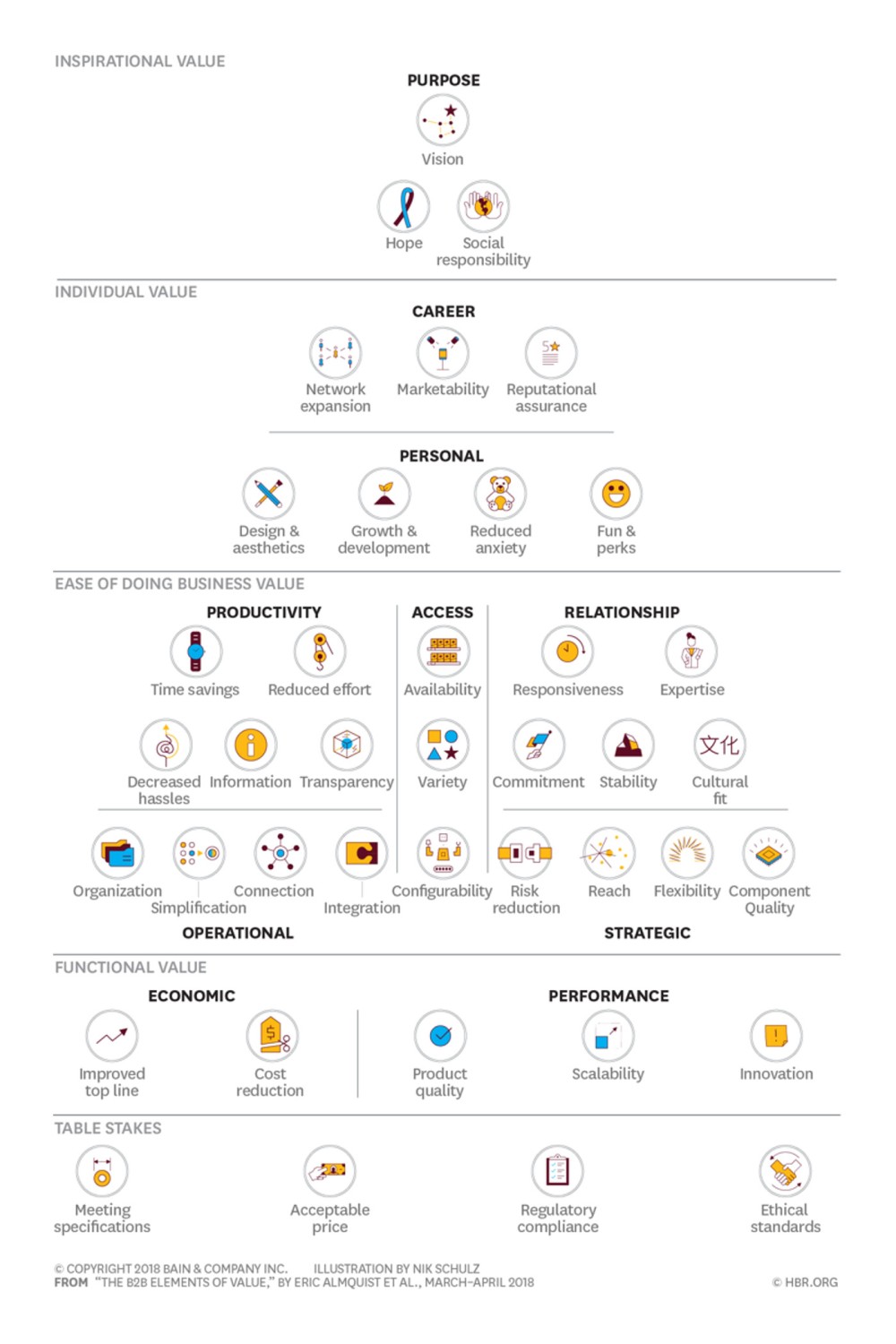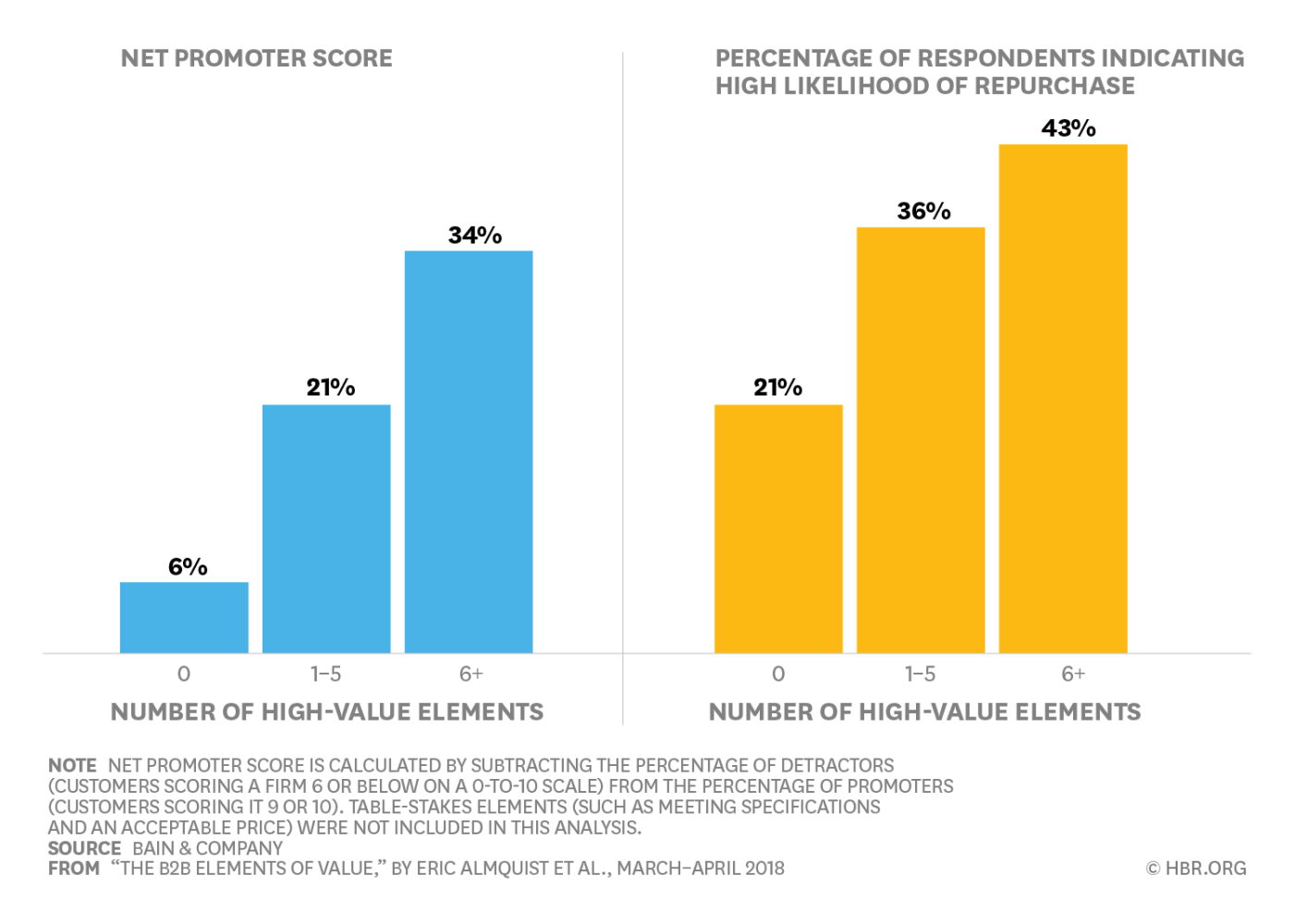In my last article, I explored the five distinct groups of decision-makers within the B2B Construction sector. Missed it? (Link to Part 1) Dive back to catch up! I concluded by mentioning that Bain and Company embarked on a quest to uncover what truly matters to B2B buyers.
To illustrate this, they crafted a pyramid depicting 40 different types of value that B2B products and services can provide, categorised into five levels. At the pyramid’s base are the most objective elements, becoming increasingly subjective towards the top.

Level One (Bottom): Table Stakes
This level encompasses essential functional components like costs, specifications, and regulatory compliance – the foundational elements without which business could not operate.
Level Two: Functional
Here, economic and performance factors such as return on investment (ROI) and scalability are taken into account. Historically, these have been the most persuasive arguments for purchasing a product or service.
Level Three: Ease of doing business
This level embodies values related to operational and strategic aspects, productivity, access, and relationships. Here, more subjective factors like commitment and cultural fit come into play.
Level Four: Individual
Up to this point, the pyramid’s values have been predominantly business-oriented and objective. However, upon reaching Level 4, they become increasingly subjective, focusing on the individual’s career and personal benefits.
Level Five (top): Inspirational
The apex hosts deeply personal values and a category named ‘Purpose’, encompassing Vision, Hope, and Social Responsibility.
Rational or emotional?
Many marketing and sales teams might only venture through the first two or three levels, appealing to the rational side at the pyramid’s base. This approach can drive short-term sales and leads, but crafting a brand with long-term efficacy necessitates connecting with audiences on an emotional level.
The more subjective, ‘emotional’, elements of value are what truly drive B2B buyers. The pyramid’s top two levels house substantial power. Remarkable outcomes can be achieved by addressing both individual and inspirational values (levels 4 and 5).
Supporting this, a 2019 report by Deloitte Digital, which surveyed 5,898 people over three years, found that businesses prioritising customers’ emotional values were twice as likely to outperform their peers in revenue growth over this period.
To escape the commodity trap, understanding the full spectrum of both rational and emotional influencing factors is imperative.
The greater the Values, the better the performance.
Bain & Company, in collaboration with Research Now and Lucid, conducted a survey of over 2,300 corporate decision-makers in the IT Infrastructure and Commercial Insurance sectors. The goal was to gain insights into how achieving the Value elements influences business performance and, notably, customer loyalty.

They collected data on opinions regarding how sellers in these industries handled the 36 non-table-stakes elements of value. (Table Stakes were excluded from the analysis as they are prerequisites for conducting business and don’t serve as differentiation points).
The results indicate a strong correlation between excelling at multiple Value elements and increased customer loyalty. There is a nearly one-to-one statistical relationship between value element performance and customer loyalty.
The significance of Values in establishing long-term relationships
Given the higher personal risk in B2B transactions compared to B2C, cultivating robust relationships with B2B customers is prudent. Best-selling marketing author Seth Godin asserts, “The secret is in understanding that the people buying from you are still people. The big difference is they’re spending someone else’s money, and your job is to give them a story they can tell their boss.”
B2B purchasers are almost 50% more likely to buy a product or service when they perceive personal value in their business purchase decision, such as career advancement opportunities or confidence in their choice (Level 4 on the pyramid). Coupling this with solid Functional and Ease of Doing Business Values sets the stage for success.
Putting the Elements to Work
John Deere has long excelled in providing reputational assurance through product quality and configurability. They have recently expanded their value by investing in productivity enhancements like remote diagnostics, the MyJohnDeere app providing weather and soil data, FarmSight analytics to help save fuel costs, and AutoTrac self-driving tractors to save on labour. Continuous feedback from their close-knit dealer network and customers has been instrumental in identifying valued improvements.
Implementing the ‘value pyramid’ with your sales and marketing teams can effectively identify crucial values. Once identified, these can form the basis for your ‘Value Proposition’. In the competitive and complex landscape of the construction industry, a strong value proposition can be a formidable tool for success.
B2B purchasers are almost 50% more likely to buy a product or service when they perceive personal value in their business purchase decision, such as career advancement opportunities or confidence in their choice (Level 4 on the pyramid). Coupling this with solid Functional and Ease of Doing Business Values sets the stage for success.
In the next part of “What Do B2B Customers Really Value?”, I’ll explore how your Value Proposition can be the determining factor in securing big contract deals.




